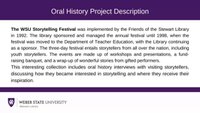| Title |
Hedman, Rachel OH26_001 |
| Creator |
Weber State University, Stewart Library: Oral History Program |
| Contributors |
Hedman, Rachel, Interviewee; Harris, Kandice, Interviewer and Video Technician |
| Collection Name |
Storytelling Festival Oral Histories |
| Description |
The WSU Storytelling Festival was implemented by the Friends of the Stewart Library in 1992. The library sponsored and managed the annual festival until 1998, when the festival was moved to the Department of Teacher Education, with the Library continuing as a sponsor. The three-day festival entails storytellers from all over the nation, including youth storytellers. The events are made up of workshops and presentations, a fund-raising banquet, and a wrap-up of wonderful stories from gifted performers. |
| Abstract |
The following is an oral history interview with Rachel Hedman, conducted on March 17, 2021, by Kandice Harris, via Zoom. Rachel discusses her life, her career as a storyteller, and her memories of the Weber State University Storytelling Festival.; The following is a video clip from an oral history interview with Rachel Hedman, conducted on March 17, 2021, via Zoom Communications Platform, by Kandice Harris. In this video clip, Rachel discusses the impact of storytelling. |
| Image Captions |
Rachel Hedman 17 March 2021; Rachel Hedman speaking about the impact of storytelling |
| Subject |
Ogden (Utah)--Maps; Storytelling; Storytelling festivals; Digital Storytelling; Storytelling--United States; COVID-19 Pandemic, 2020- |
| Keywords |
Professional storytellers; Virtual Storytelling; Weber State University |
| Digital Publisher |
Stewart Library, Weber State University, Ogden, Utah, USA |
| Date |
2021 |
| Temporal Coverage |
1994; 1995; 1996; 1997; 1998; 1999; 2000; 2001; 2002; 2003; 2004; 2005; 2006; 2007; 2008; 2009; 2010; 2011; 2012; 2013; 2014; 2015; 2016; 2017; 2018; 2019; 2020; 2021 |
| Medium |
oral histories (literary genre) |
| Spatial Coverage |
Ogden, Weber, Utah, United States, https://sws.geonames.org/5779206, 41.223, -111.97383 |
| Type |
Text; Image/StillImage; Image/MovingImage |
| Access Extent |
16 page PDF; Video clip is an mp4 file, 104 MB |
| Conversion Specifications |
Filmed and recorded using Zoom Communications platform. Transcribed using otranscribe.com. |
| Language |
eng |
| Rights |
Materials may be used for non-profit and educational purposes, please credit University Archives; Weber State University; Background music for the opening of the video clip was downloaded from https://uppbeat.io/t/sky-toes/the-long-ride-home; License Code SHMYB9XWFGM8KLVU; Background music for the closing of the video clip was downloaded from https://uppbeat.io/t/yeti-music/gentle-breeze; License Code IWGKRYG7XHQOMZY0 |
| Source |
Hedman Rachel OH26_001 Weber State University Archives |
| Format |
application/pdf; video/mp4 |
| ARK |
ark:/87278/s6ksvttp |
| Setname |
wsu_sf |
| ID |
111920 |
| Reference URL |
https://digital.weber.edu/ark:/87278/s6ksvttp |
| Title |
Hedman, Rachel OH26_001 |
| Creator |
Weber State University, Stewart Library: Oral History Program |
| Contributors |
Hedman, Rachel, Interviewee; Harris, Kandice, Interviewer and Video Technician |
| Description |
The WSU Storytelling Festival was implemented by the Friends of the Stewart Library in 1992. The library sponsored and managed the annual festival until 1998, when the festival was moved to the Department of Teacher Education, with the Library continuing as a sponsor. The three-day festival entails storytellers from all over the nation, including youth storytellers. The events are made up of workshops and presentations, a fund-raising banquet, and a wrap-up of wonderful stories from gifted performers. |
| Abstract |
The following is an oral history interview with Rachel Hedman, conducted on March 17, 2021, by Kandice Harris, via Zoom. Rachel discusses her life, her career as a storyteller, and her memories of the Weber State University Storytelling Festival. |
| Image Captions |
Rachel Hedman 17 March 2021 |
| Subject |
Ogden (Utah)--Maps; Storytelling; Storytelling festivals; Digital Storytelling; Storytelling--United States; COVID-19 Pandemic, 2020- |
| Keywords |
Professional storytellers; Virtual Storytelling; Weber State University |
| Digital Publisher |
Stewart Library, Weber State University, Ogden, Utah, USA |
| Temporal Coverage |
1994; 1995; 1996; 1997; 1998; 1999; 2000; 2001; 2002; 2003; 2004; 2005; 2006; 2007; 2008; 2009; 2010; 2011; 2012; 2013; 2014; 2015; 2016; 2017; 2018; 2019; 2020; 2021 |
| Medium |
oral histories (literary genre) |
| Spatial Coverage |
Ogden, Weber, Utah, United States, https://sws.geonames.org/5779206, 41.223, -111.97383 |
| Type |
Text; Image/StillImage |
| Access Extent |
16 page PDF |
| Language |
eng |
| Rights |
Materials may be used for non-profit and educational purposes, please credit University Archives; Weber State University |
| Source |
Hedman Rachel OH26_001 Weber State University Archives |
| Format |
application/pdf |
| Setname |
wsu_sf |
| ID |
111962 |
| Reference URL |
https://digital.weber.edu/ark:/87278/s6ksvttp/111962 |





